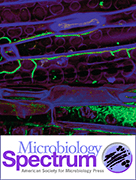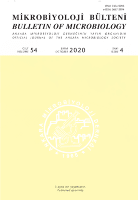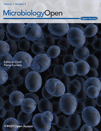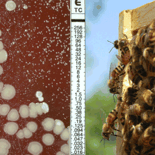
Jundishapur Journal of Microbiology
Scope & Guideline
Innovating insights into medical microbiology and public health.
Introduction
Aims and Scopes
- Microbiological Pathogenesis and Disease:
Research focusing on the role of various microorganisms in human diseases, including bacterial, viral, and fungal infections. Studies often explore the mechanisms of pathogenicity and host-pathogen interactions. - Antimicrobial Resistance:
A significant emphasis on the emergence and mechanisms of resistance in pathogens, particularly focusing on multidrug-resistant strains and the genetic basis of resistance mechanisms. - Clinical Microbiology and Infectious Diseases:
Investigations into clinical cases, epidemiological studies, and the characterization of microbial infections in different populations, including children and immunocompromised patients. - Diagnostic Innovations:
Development and evaluation of new diagnostic methods, including molecular techniques, to improve the identification and management of infectious diseases. - Environmental Microbiology:
Research on the microbial diversity in various environments, including clinical settings, and the impact of microorganisms on public health. - Therapeutic Approaches:
Exploration of new therapeutic agents, including the use of phages, probiotics, and novel compounds to combat infections and improve treatment outcomes.
Trending and Emerging
- COVID-19 Related Research:
A significant increase in studies related to COVID-19, including its clinical impacts, associated infections, and immune responses. This trend highlights the ongoing global health crisis and its implications for microbiology. - Molecular Characterization and Genomics:
Emerging focus on the genomic characterization of pathogens to understand their resistance mechanisms and virulence factors, reflecting advancements in sequencing technologies. - Biomarkers for Disease Severity:
Growing interest in identifying biomarkers associated with the severity of infectious diseases, particularly for COVID-19 and other viral infections, which can aid in prognosis and treatment. - Therapeutic Drug Monitoring and Personalized Medicine:
Increasing research on therapeutic drug monitoring, particularly in pediatric and immunocompromised populations, indicating a trend towards personalized treatment strategies. - Novel Antimicrobial Strategies:
Emerging studies on innovative therapeutic approaches, including the use of phage therapy, antimicrobial peptides, and natural products, to combat resistant strains.
Declining or Waning
- Traditional Antibiotic Studies:
There has been a noticeable reduction in studies focused solely on traditional antibiotics without exploring multidrug resistance or novel therapeutic approaches. This shift indicates a growing awareness of the limitations of existing antibiotics. - Non-Clinical Microbiology:
Research that previously focused on non-clinical settings, such as environmental or industrial microbiology, is less frequently reported, suggesting a shift towards clinical applications and human health. - Basic Microbial Ecology:
Basic studies on microbial ecology and diversity without direct clinical relevance have decreased, possibly due to increased emphasis on translational research that directly impacts patient care.
Similar Journals

Microbiology Spectrum
Empowering discoveries in microbiology and beyond.Microbiology Spectrum is a prominent peer-reviewed journal published by the American Society for Microbiology, dedicated to advancing the field of microbiology through the dissemination of high-quality research. Since its inception in 2013 and continuing until 2024, the journal has established a strong presence in key domains such as microbiology, immunology, cell biology, and ecology, achieving impressive quartile rankings including Q1 in Infectious Diseases and Q1 in Immunology and Microbiology as of 2023. With an emphasis on open access to its scholarly content, Microbiology Spectrum aims to foster collaboration and knowledge sharing among researchers, professionals, and students alike. The journal's scope encompasses a diverse range of topics pertinent to the field, making it an essential resource for anyone involved in microbiological research and its applications. Researchers looking to publish their findings in a respected journal will find Microbiology Spectrum's robust impact factor and Scopus rankings serve as testament to its significance and influence within the academic community.

MIKROBIYOLOJI BULTENI
Shaping the Future of Microbial ScienceMIKROBIYOLOJI BULTENI, with ISSN 0374-9096, is a prestigious academic journal published by the ANKARA MICROBIOLOGY SOC, located in Ankara, Turkey. Established in 1973, this journal has been a vital conduit for disseminating research in the fields of Immunology, Microbiology, and Infectious Diseases, garnering a reputation as a significant contributor to the scientific community. The journal is currently ranked in the Q3 category within Immunology and Microbiology (miscellaneous), and Infectious Diseases, indicating its impactful presence amidst contemporary research. With access options that may be restricted, MIKROBIYOLOJI BULTENI actively welcomes submissions that advance the understanding of critical microbiological principles and practices, thereby supporting both national and international research efforts. Researchers, professionals, and students are encouraged to explore the latest findings shared in this journal, as it continually shapes the landscape of microbiology and infectious disease studies through its comprehensive and rigorous peer-reviewed publications.

CURRENT MICROBIOLOGY
Charting New Territories in Microbiology ResearchCURRENT MICROBIOLOGY, published by SPRINGER, is a renowned journal that serves as a critical platform for the dissemination of cutting-edge research in the field of microbiology. With an ISSN of 0343-8651 and an E-ISSN of 1432-0991, this journal contributes significantly to the scientific community by covering a diverse range of topics from applied microbiology and biotechnology to various aspects of medicine. Currently operating an impact factor that places it within the Q2 quartile in both applied microbiology and biotechnology and medicine (miscellaneous), along with a Q3 ranking in microbiology, CURRENT MICROBIOLOGY is recognized for its valuable contributions to these dynamic fields. This journal, which has documented the evolution of microbiological research since its inception in 1978, provides an essential venue for researchers, professionals, and students alike to explore innovative studies and advances. Although it does not offer open access, the journal remains a pivotal resource within its category, complementing the ongoing growth and exploration of microbiology from its headquarters at One New York Plaza, Suite 4600, New York, NY 10004, United States. Its Scopus rankings highlight its reputable standing, making it a key publication for anyone aiming to stay at the forefront of microbiological science.

MicrobiologyOpen
Fostering innovation and insight in microbiological science.MicrobiologyOpen is a prestigious, open access journal published by WILEY, dedicated to advancing the field of microbiology. Since its inception in 2012, this journal has firmly established itself as a significant platform for researchers, professionals, and students alike, facilitating the dissemination of high-quality research findings across a wide range of microbiological disciplines. With an impressive impact factor and a ranking in the 76th percentile of Scopus for immunology and microbiology, MicrobiologyOpen offers a robust forum for innovative studies, reviews, and compelling insights that push the boundaries of scientific understanding. The journal's commitment to open access ensures that groundbreaking research is freely available to the global community, fostering collaboration and knowledge-sharing. As it continues to evolve until 2024, MicrobiologyOpen remains pivotal for anyone looking to stay at the forefront of microbiological research.

Mediterranean Journal of Infection Microbes and Antimicrobials
Elevating research on infectious diseases and antimicrobials.Mediterranean Journal of Infection Microbes and Antimicrobials is a distinguished open-access journal published by GALENOS PUBL HOUSE, dedicated to advancing the understanding of infectious diseases and microbiology. Since its inception in 2011, this journal has been a vital resource for researchers, professionals, and students interested in the intricate world of microbes and their impacts on human health. With its ISSN 2147-673X, the journal has progressively gained visibility, although it currently holds a Q4 ranking in multiple categories including Immunology and Microbiology, and Infectious Diseases for the year 2023. The journal operates from its headquarters in Istanbul, Turkey, and features a rich array of articles that contribute to the field’s body of knowledge. As a platform enhancing the accessibility of research, it invites submissions from global contributors to foster collaboration and innovation in tackling microbial challenges.

JOURNAL OF MICROBIOLOGY
Advancing microbial science for a better tomorrow.JOURNAL OF MICROBIOLOGY, published by the Microbiological Society Korea, is a prestigious peer-reviewed journal dedicated to the advancement of knowledge in the fields of microbiology, applied microbiology, and biotechnology. Established in 1996, this journal serves as a vital platform for researchers and professionals from around the globe to disseminate their findings and engage in multidisciplinary discussions pertaining to microbial sciences. With an H-index that reflects its impact, the journal holds a commendable Q2 ranking in key categories including Applied Microbiology and Biotechnology, as well as Medicine (Miscellaneous), which underscores its significance in the academic community. Despite being a subscription-based journal, the JOURNAL OF MICROBIOLOGY aims to contribute to the understanding of microbial processes and their applications, facilitating advancements that are essential in health, industry, and environmental sciences. Researchers, students, and practitioners are encouraged to explore this rich resource for the latest research and trends in microbiology.

ARCHIVES OF MICROBIOLOGY
Pioneering Insights in Microbiology Since 1974The Archives of Microbiology, published by Springer, is a reputable journal in the field of microbiology, serving as a vital platform for the dissemination of groundbreaking research and critical reviews since its inception in 1974. With an ISSN of 0302-8933 and an E-ISSN of 1432-072X, this journal operates out of Germany and maintains a global reach, promoting high-quality scholarship across multiple disciplines, including biochemistry, genetics, and molecular biology, as evidenced by its Q2 ranking in Medicine (miscellaneous) and consistent Q3 placements in other categories in 2023. Although the journal does not offer open access options, its rigorous peer-review process ensures that published articles are of the highest standard, making it an essential resource for researchers, professionals, and students keen on advancing their understanding of microbial sciences. As the journal converges toward 2024, it remains committed to fostering innovative microbiological research and facilitating interdisciplinary dialogue within the scientific community.

Frontiers in Cellular and Infection Microbiology
Unlocking the secrets of immunity and infectious diseases.Frontiers in Cellular and Infection Microbiology, published by FRONTIERS MEDIA SA, is a leading Open Access journal that has been at the forefront of microbiological research since 2011. Located in Switzerland, this journal aims to provide a platform for innovative and impactful studies in various domains including immunology, infectious diseases, and medical microbiology. With an impressive range of quartile rankings—Q1 in Infectious Diseases, Microbiology, and Microbiology (medical), and Q2 in Immunology—as of 2023, it positions itself as a highly reputable source in the academic community. Furthermore, its Scopus rankings highlight its significance within the respective fields, with top percentiles in key categories, making it an essential resource for researchers, professionals, and students alike. As an Open Access publication, it ensures that vital findings are accessible to a global audience, fostering collaboration and advancement in science.

mBio
Championing rigorous research in microbiology and virology.mBio is a premier, peer-reviewed open-access journal published by the American Society for Microbiology, dedicated to advancing the field of microbiology and virology. With an impressive impact factor and a commendable standing within the top quartiles (Q1) of both microbiology and virology categories as of 2023, mBio offers a dynamic platform for researchers and professionals to disseminate high-quality, rigorous scientific findings. Since its inception in 2010, it has served as a vital resource for the global scientific community, facilitating open access to groundbreaking research that spans diverse topics within microbiology. With a Scopus ranking of #28 out of 182 in Microbiology and #16 out of 80 in Virology, mBio significantly influences ongoing research trends and informs best practices in the field. Its commitment to open-access publishing allows for widespread visibility and accessibility, ensuring that critical discoveries reach a broad audience, including students and academics eager to contribute to, and learn from, cutting-edge science.

GERMS
Advancing global health through innovative research.GERMS is a multidisciplinary journal published by the EUROPEAN ACAD HIV-AIDS & INFECTIOUS DISEASES, dedicated to advancing knowledge in the fields of epidemiology, immunology, infectious diseases, and microbiology. Since its inception in 2011, the journal has provided a crucial platform for researchers and practitioners to share innovative studies, clinical findings, and public health insights, with an eye on improving health outcomes globally. With an ISSN of 2248-2997 and a consistent publication trajectory leading up to 2024, GERMS is recognized in the third quartile across several categories, reflecting its growing impact and relevance in the scientific community. Authors and readers benefit from a range of access options, fostering the dissemination of vital research findings. As a journal situated in Romania, it also addresses regional health challenges while contributing to the broader discourse on infectious diseases and public health. GERMS is not just a repository of knowledge, but a vital resource for those engaged in combating infectious diseases and promoting health equity.